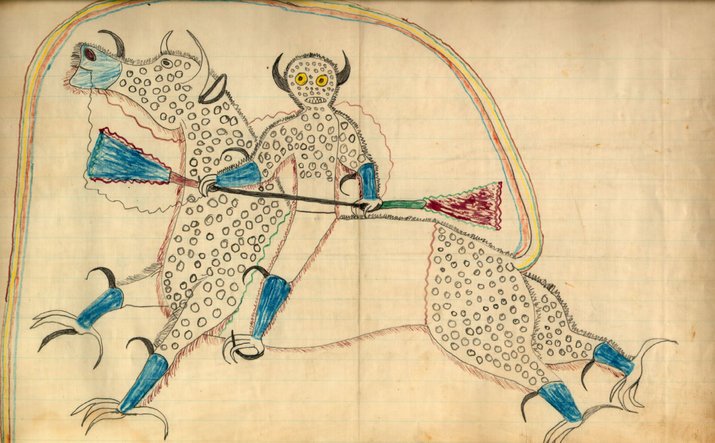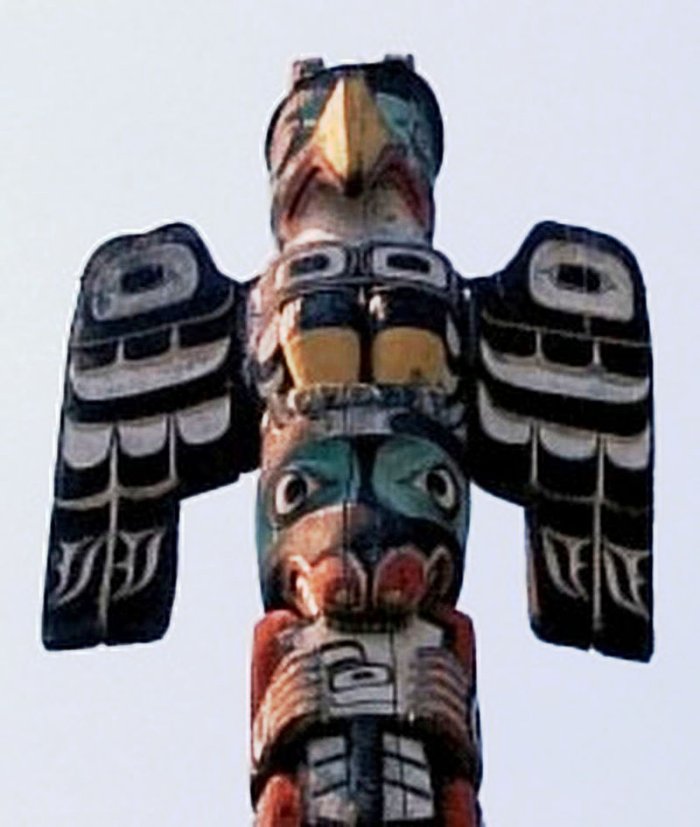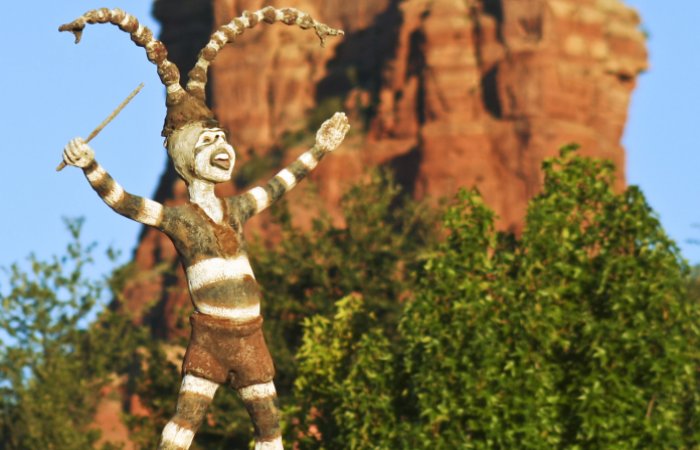Heyoka – Sacred Clown Who By Doing The Opposite Helps And Guides In Daily Life
Ellen Lloyd - AncientPages.com - Like many other characters encountered in Native American mythology, Heyoka teaches us valuable life lessons.
Heyoka is an entertaining figure; everything this creature does is always the opposite of the people around him.
Ledger artwork by Lakota artist Black Hawk representing a dream of a thunder being. c.1880. Credit: Public Domain
We may laugh at him because it's a funny creature but don't underestimate the sacred clown because he brings knowledge to you. Paradoxically, his unusual and irresponsible behavior can actually help and guide us in daily life.
Heyoka often gives us a better understanding of ourselves and our world.
Heyoka And Visions Of The Thunderbird
Worshipped by the Lakota people, Heyoka is a sacred clown or sometimes a fool who enjoys tricking or joking with people. Heyoka, a trickster, can be a man or a woman.
According to Native American beliefs, the nature of a Heyoka is complicated. As many of our readers may already know, Native Americans believe that we were put on Earth for a particular reason. Still, we often do not understand why and without this knowledge, we feel lost and confused. That's why Native Americans practice a vision quest that is meant to open the door to the spiritual world and help us find our path in life.
According to Black Elk (1863 -1950), a medicine man and second cousin of the war chief Crazy Horse, to earn the title Heyoka, one must have had extraordinary visions of thunderbirds.
Thunderbird on top of Totem Pole in Thunderbird Park in Victoria, BC Canada. Credit: Dr. Haggis, Wikipedia, CC BY-SA 3.0
Heyoka is a keeper of sacred knowledge, but it can only be shared with people through funny actions.
As previously mentioned in our article on Ancient Pages, the legendary and powerful Thunderbird in Native American mythology was sent by the Gods to protect humans from evil.
If a person is recognized as a Heyoka, then they must participate in a ceremony and claim the title.
Heyoka's Power As A Sacred Clown
Just because Heyoka is called a sacred clown or fool doesn't mean it's a stupid individual. On the contrary, Heyoka forces us to look at ourselves and the world around us differently. Moreover, his existence and silly behavior give us an excellent opportunity to find answers to questions we have never contemplated before.
Heyoka is a bringer of knowledge. Credit: Adobe Stock - Derrick Neill
Heyoka is a being with a backward-forwards, upside-down, or contrary nature. If someone moves forward, Heyoka will go backward. If Heyoka rides a horse, he does it backward, wearing his clothes inside-out. As a clown, Heyoka is, of course, funny, and he always does everything differently.
If it's cold outside and people put clothes on, Heyoka has no problems going out naked. The same applies when it's hot. He can then be seen wearing plenty of clothes while other people go around half-naked.
There are several reasons why sacred clowns are important to Native Americans. We may think it's just a clown whose job is to entertain us, but this intriguing figure is much more powerful than just that.
The sacred clown has the power to heal emotional pain, but making sad people laugh, and his jokes can be comforting. Heyoka acts as a mirror so we can see others' behavior and start the healing process.
Heyoka acts like a mirror and shows you your dark side. Credit: Public Domain
Heyoka, as a mirror, can be described as a teacher who, by using extreme behaviors to mirror others, forces us to examine our doubts, fears, hatred, and weaknesses. Of course, every person has dark personality traits and emotions we keep hidden, but Heyoka shows us the other side of our nature.
Heyoka's behavior makes us study people, surroundings, and situations differently, which gives us a new, fresh perspective that can eventually lead to experiencing life-changing insights.
Sacred clowns are essential members of the tribes of the Planes Indians. Heyokas maintain social balance and dare to ask difficult and taboo questions no-one dared to ask before. They can also question established answers, forcing us to re-evaluate our behavior or knowledge.
By breaking the rules and violating norms and taboos, sacred clowns force us to set boundaries and define acceptable ethical and moral behavior guidelines.
In Lakota mythology, Heyoka is sometimes described as a spirit of thunder and lightning. Still, this interesting creature can also appear as an animal, such as a snowbird, horse, dog, night hawk, or even a dragonfly. Thus, Heyoka can occur in many different shapes, but his true nature brings us sacred knowledge.
Written by Ellen Lloyd – AncientPages.com
Updated on October 25, 2023
Copyright © AncientPages.com All rights reserved. This material may not be published, broadcast, rewritten or redistributed in whole or part without the express written permission of AncientPages.com
Expand for referencesMore From Ancient Pages
-
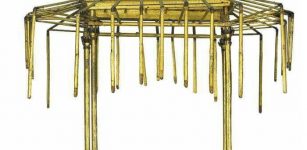 Was Tutankhamun’s Chariot Equipped With Its Own Sunshade?
Archaeology | Jun 27, 2019
Was Tutankhamun’s Chariot Equipped With Its Own Sunshade?
Archaeology | Jun 27, 2019 -
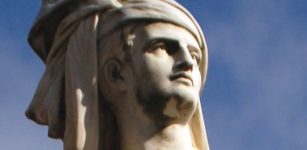 On This Day In History: Historical Scandal Took Place In France – On July 31, 1451
News | Jul 31, 2016
On This Day In History: Historical Scandal Took Place In France – On July 31, 1451
News | Jul 31, 2016 -
 On This Day In History: First Wireless Transmission Of Morse Signals Sent – On Mar 12, 1896
News | Mar 12, 2017
On This Day In History: First Wireless Transmission Of Morse Signals Sent – On Mar 12, 1896
News | Mar 12, 2017 -
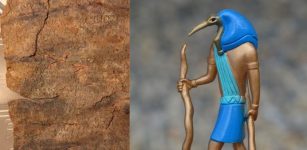 Curse Of The Dancer – Mysterious 1,500-Year-Old Tablet Finally Deciphered
Archaeology | Oct 14, 2019
Curse Of The Dancer – Mysterious 1,500-Year-Old Tablet Finally Deciphered
Archaeology | Oct 14, 2019 -
 Unusual Relic That Mysteriously Disappeared From The Vatican
Artifacts | Nov 8, 2018
Unusual Relic That Mysteriously Disappeared From The Vatican
Artifacts | Nov 8, 2018 -
 Mysterious Mummified Woman With A Christian Cross On Her Chest Dashes Hopes Of Finding First Russian Fortress In Yakutia
Archaeology | Dec 12, 2019
Mysterious Mummified Woman With A Christian Cross On Her Chest Dashes Hopes Of Finding First Russian Fortress In Yakutia
Archaeology | Dec 12, 2019 -
 On This Day In History: Coverdale Bible Printed In English For The First Time – On Oct 4, 1535
News | Oct 4, 2016
On This Day In History: Coverdale Bible Printed In English For The First Time – On Oct 4, 1535
News | Oct 4, 2016 -
 Viking King – How Was He Elected And What Was Expected From Him?
Ancient History Facts | Apr 12, 2023
Viking King – How Was He Elected And What Was Expected From Him?
Ancient History Facts | Apr 12, 2023 -
 Ullikummi – Genderless, Blind, Deaf Rock Monster Created For Strategic Purposes In Beliefs Of Hurrian People
Featured Stories | Sep 3, 2024
Ullikummi – Genderless, Blind, Deaf Rock Monster Created For Strategic Purposes In Beliefs Of Hurrian People
Featured Stories | Sep 3, 2024 -
 Odd Ancient Dwellings Of The Snake People – American-European Connection Part 1
Featured Stories | Sep 6, 2020
Odd Ancient Dwellings Of The Snake People – American-European Connection Part 1
Featured Stories | Sep 6, 2020 -
 Nanna: Mesopotamian Moon God, Lord Of Wisdom And Father Of The Gods
Featured Stories | Apr 1, 2017
Nanna: Mesopotamian Moon God, Lord Of Wisdom And Father Of The Gods
Featured Stories | Apr 1, 2017 -
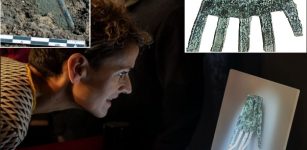 Earliest Document Written 2,100 Years Ago May Rewrite History Of The Basque Language
Archaeology | Nov 17, 2022
Earliest Document Written 2,100 Years Ago May Rewrite History Of The Basque Language
Archaeology | Nov 17, 2022 -
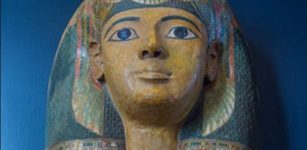 Ancient Egyptians Knowledge Of Psychiatry – Importance Of The Sorcerer And The Mysterious Zar Dance
Ancient History Facts | Apr 24, 2020
Ancient Egyptians Knowledge Of Psychiatry – Importance Of The Sorcerer And The Mysterious Zar Dance
Ancient History Facts | Apr 24, 2020 -
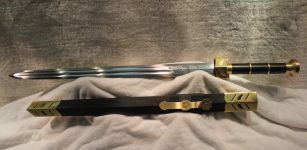 Ancient History Of Chinese Swords
Featured Stories | Aug 20, 2018
Ancient History Of Chinese Swords
Featured Stories | Aug 20, 2018 -
 Fossil Of Extinct Human Species Reveals Climate Change Led To Unexpected Anatomical Changes 2 Million Years Ago
Archaeology | Nov 11, 2020
Fossil Of Extinct Human Species Reveals Climate Change Led To Unexpected Anatomical Changes 2 Million Years Ago
Archaeology | Nov 11, 2020 -
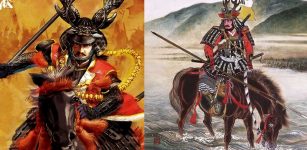 Spells And Magic Were Important To Samurai Warriors And Used In Battles
Featured Stories | Oct 7, 2017
Spells And Magic Were Important To Samurai Warriors And Used In Battles
Featured Stories | Oct 7, 2017 -
 Long-Lost Viking Waterway Leading To Orkney, The Great Norse Empire – Discovered
Archaeology | Aug 5, 2020
Long-Lost Viking Waterway Leading To Orkney, The Great Norse Empire – Discovered
Archaeology | Aug 5, 2020 -
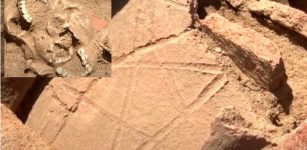 Early Christian Necropolis Unearthed In Sant’Appianu Cathedral In Sagone, Corsica
Archaeology | Aug 3, 2020
Early Christian Necropolis Unearthed In Sant’Appianu Cathedral In Sagone, Corsica
Archaeology | Aug 3, 2020 -
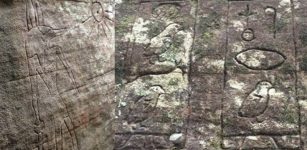 Mysterious Gosford Glyphs: Remarkable Ancient Egyptian Hieroglyphs Discovered In Australia Could Re-Write History
Featured Stories | Feb 20, 2020
Mysterious Gosford Glyphs: Remarkable Ancient Egyptian Hieroglyphs Discovered In Australia Could Re-Write History
Featured Stories | Feb 20, 2020 -
 Human Activities In The Year 1300 Impacted Earth’s Atmosphere More Than Previously Known
Archaeology | Oct 9, 2021
Human Activities In The Year 1300 Impacted Earth’s Atmosphere More Than Previously Known
Archaeology | Oct 9, 2021

